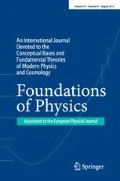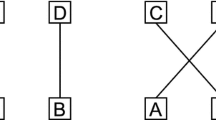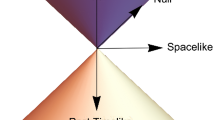Abstract
In a recent paper [e-print quant-ph/0101012], Hardy has given a derivation of “quantum theory from five reasonable axioms.” Here we show that Hardy's first axiom, which identifies probability with limiting frequency in an ensemble, is not necessary for his derivation. By reformulating Hardy's assumptions, and modifying a part of his proof, in terms of Bayesian probabilities, we show that his work can be easily reconciled with a Bayesian interpretation of quantum probability.
Similar content being viewed by others
References
Studies in Subjective Probability, 2nd edn., H. E. Kyburg and H. E. Smokler, eds. (Krieger Publishing, Huntington, NY, 1980).
J. M. Bernardo and A. F. M. Smith, Bayesian Theory (Wiley, Chichester, 1994).
C. M. Caves, C. A. Fuchs, and R. Schack, “Conditions for comp00atibility of quantum state assignments, ” Phys. Rev. A 66, 062111(2002).
D. Malakoff, “Bayes offers a ‘new’ way to make sense of numbers, ” Science 286, 1460(1999).
C. M. Caves, C. A. Fuchs, and R. Schack, “Quantum probabilities as Bayesian probabilities, ” Phys. Rev. A 65, 022305(2002).
C. M. Caves, C. A. Fuchs, and R. Schack, “Unknown quantum states: The quantum de Finetti representation, ” J. Math. Phys. 43, 4537(2002).
R. Schack, T. A. Brun, and C. M. Caves, “Quantum Bayes rule, ” Phys. Rev. A 64, 014305(2001).
T. A. Brun, C. M. Caves, and R. Schack, “Entanglement purification of unknown quantum states, ” Phys. Rev. A 63, 042309(2001).
L. Hardy, “Quantum theory from five reasonable axioms, ” e-print quant-ph/0101012 v4 (25 September 2001).
L. Hardy, “Why quantum theory?, ” in Proceedings of the NATO Advanced Research Workshop on Modality, Probability, and Bell's theorem, J. Butterfield and T. Placek, eds. (IOS Press, Amsterdam, 2002); e-print quant-ph/0111068.
R. von Mises, Probability, Statistics, and Truth (Dover, New York, 1957).
B. C. van Fraassen, “Relative frequencies, ” Synthese 34, 133(1977).
E. T. Jaynes, Probability Theory (Cambridge University Press, Cambridge, 2003).
L. Hardy, private communication. See also remarks at the end of Sec. 6.1 of Ref. 9.
C. A. Fuchs, “Quantum states: What the hell are they?, ” unpublished (2002), pp. 159-166, available at http://cm.bell-labs.com/who/cafuchs.
C. A. Fuchs, “Quantum mechanics as quantum information (and only a little more), ” e-print quant-ph/0205039.
Author information
Authors and Affiliations
Rights and permissions
About this article
Cite this article
Schack, R. Quantum Theory from Four of Hardy's Axioms. Foundations of Physics 33, 1461–1468 (2003). https://doi.org/10.1023/A:1026044329659
Issue Date:
DOI: https://doi.org/10.1023/A:1026044329659




